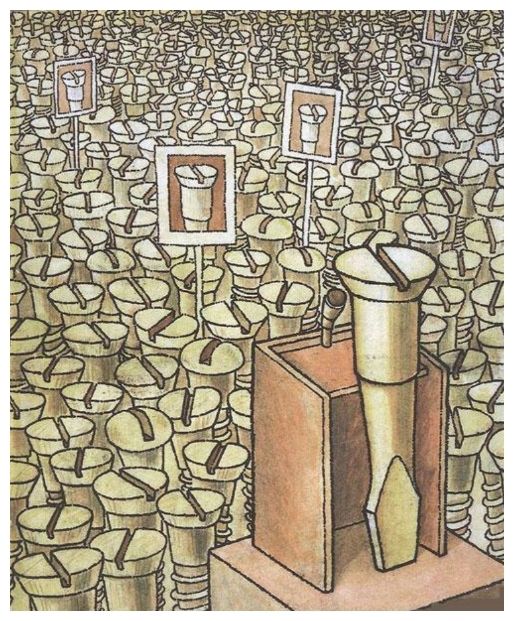I used to think this was just a snarky saying, but I’ve come to realize it’s the truth.
I received in the mail this week a survey from the RNC. Attached was a letter, supposedly penned by Reince Priebus, that begins:
Preparing for the 2016 Presidential Election is going to take a massive grassroots effort all across America.
As Tam once observed about the gun control crowd, “they’ve been playing on astroturf so long that they don’t know grassroots even when fed a mouthful of divot.”
The survey has four sections before it gets to begging for money. The first section is demographic data gathering – what do I consider myself to be politically? Am I planning on voting in the 2016 election? How old am I? Am I willing to volunteer at a local Republican Party office or help campaign for a Republican candidate? Where do I get my news? But the last two questions set the tone for the rest of the survey:
10: Do you believe the Republican Party should continue to embrace social issues or are these too divisive when it comes to winning elections?
_Embrace
_Too divisive
_No Opinion
11: Please register your opinion on the following social issues, 1 = SUPPORT, 2 = OPPOSE 3 = NO OPINION
_School Prayer
_Faith Based Initiatives
_Ban Burning of the Flag
_Fight against same sex marriage
_Ban human cloning
_Ban Federal funds for birth control
_Ban all abortion
_Ban Federal funds for abortion
_Other__________________
(*sigh*)
What happened to SMALLER GOVERNMENT?!?
Section 2 covers “General issues” such as do I believe the country is headed in the right or wrong direction, what three issues do I believe are most important to people in my area, and which party is better able to handle these issues? I’ll skip that except to say “government overreach” wasn’t on the list except as the write-in “Other.”
Section 3 covers “Domestic issues.” Here I’ll start quoting in full:
1. How confident are you that America’s economy will improve in the next year?
Five choices from “Strongly Confident to Not Confident at all.
2. Which of the following is the single most important economic issue facing you and your family?
_Unemployment
_Inflation/Rising Prices Overall
_Cost of Health Care
_High Taxes
_Concern over funding for Social Security and Medicare
_Other ____________
Another vote for “Other.”
3. Do you think our Republican leaders in Congress should be aggressive in forcing the Obama White House to work with them to create jobs, cut taxes and regulations, end economic uncertainty, and make America more competitive?
_Yes
_No
_No Opinion
Hint: The government doesn’t “create jobs” except when it creates or expands another bureau or regulatory structure.
4. Do you favor efforts by Republicans in Congress to cut the present corporate tax rate (currently on of the highest in the world) in order to help bring more businesses back to the U.S., where they can invest their dollars in expanding their operations and creating new jobs?
_Yes
_No
_No Opinion
Holy shit! A reasonable question!
5. Do you favor a major overhaul of the current Federal Tax Code – currently thousands of pages long – that would replace today’s burdensome tax system with one that is simpler and fairer?
Now they’re just teasing, the bastards.
6. How concerned are you that our federal debt – presently $18 trillion – will seriously jeopardize our nation’s economic security for future generations?
Like they’re actually going to DO anything about it except make it bigger?
7. Are race relations in America today getting better or worse?
Well, they told me if I voted for Romney….
8. The Obama White House and Democrats in Congress are aggressively pushing for a higher federal minimum wage. Do you feel that forcing employers to pay higher wages will hurt or help the economy?
Well, the government doesn’t “create jobs,” but it can certainly destroy them.
9. Should Republicans in Congress stand firm against actions by the Obama White House to bypass Congressional votes and enact new regulations, fees, and other freedom-destroying measures via unilateral Executive Orders?
Uh, READ THE CONSTITUTION whydoncha?
10. With revelations of “Fast and Furious,” IRS abuses, the Benghazi cover-up, and other major scandals in recent years, do you feel Republican lawmakers on Capitol Hill have the right to hold government bureaucrats’ feet to the fire and demand more transparency from the Obama administration?
They have the authority. They don’t have the SPINE.
Do you believe more federal laws that impede individuals’ Second Amendment rights are the proper response to recent gun violence in our nation?
“Gun Control: It’s what you do instead of something.”
12. Do you support Republican efforts to defer fully implementing ObamaCare and replacing it with something that will address the high cost of health care while maintaining the quality of care?
No, I think the whole thing should be repealed, period. Forget trying to “fix” it. THAT target will never stop moving. But the Republicans won’t do that, so they’re signalling that they want to “delay” it until they can legislate an (equivalent) alternative.
13. Do you think one of the government’s top priorities should be to preserve the financial stability of Medicare and Social Security?
I think one of government’s top priorities should be to get people to understand that both programs are operating deeply in the red, and they CANNOT CONTINUE as they are, nor can they be EXPANDED. But I’m fully aware that the job of the politician is to get elected and keep getting elected so that’s not a position any politician is going to take.
14. Do you favor Republican efforts in Congress to better strengthen our borders and fight President Obama’s unconstitutional, unilateral decrees in writing new immigration policies?
You mean like you fought his unconstitutional, unilateral decrees delaying the implementation of ObamaCare? Just askin’.
15. Would you support immigration reform that included securing our nations borders and a path to citizenship for some people living in the U.S. illegally if they were required to learn English, go to the back of the citizenship line, have a job, pay taxes and pass a criminal background check?
Being here illegally, wouldn’t they fail the criminal background check?
16. Should the federal government open up more federal lands to energy development in order to further foster America’s energy independence?
Shouldn’t the federal government own less land in the first place? It owns, for instance 61.8% of Alaska, 42.3% of Arizona, 36.2% of Colorado, 61.7% of Idaho, and 81.1% of Nevada. Why?
17. Do you feel that actions by the Obama Administration in recent years have seriously eroded America’s individual freedoms?
I’m not blaming all of that on him. I will blame serious erosion of our foreign policy on his administration, but the DHS, the TSA, NSA spying and the like did not originate with Obama. The dismantling of our foreign policy and our influence around the world, on the other hand….
This completed the “Domestic Issues” questionnaire. Section 4 covered “National Defense”:
1. Are Republicans in Congress right to fight back against the Obama Administration’s efforts to severely cut America’s military power?
Duh.
2. Do you think it is in the United States’ national interest to take military action against ISIS in Iraq and Syria?
Hell, there isn’t any good answer to this. All options suck.
3. Should America take military action if necessary to keep Iran and North Korea from obtaining nuclear weapons?
Doesn’t Lil’ Kim already have some wet-firecracker nukes? As former Secretary of State Madeleine Not-so-Bright told us about North Korea and Clinton’s treaty efforts:
“No, what they were doing, as it turns out, they were cheating.”
But we should trust the Iranians. It’s not like they have special religious dispensation allowing them to lie or anything. Not that politicians give a damn about telling the truth ever anyway. How about we let China deal with Lil’ Kim and Israel deal with Iran? We’ll just provide Israel MigCAP and KC-135 support.
4. Do you agree with Republicans’ commitment to continue to fully fund a “missile defense shield” for our nation to protect us from future missile threats?
Define “fully fund.” How much?
5. Do you believe our government is doing enough to protect the homeland from future terrorist attacks?
You mean setting up people in “terrorist sting” operations? “Thousands Standing Around” who have yet to prevent one terrorist act on a flight? Telling us that a guy yelling “Allahu Ackbar” while shooting up a military base was actually committing “workplace violence“? Yeah, redefining “terrorist attacks” as “workplace violence” helps “protect the homeland”!
Hey, I know! Let’s have the NSA record every single phone conversation in the U.S.! I’m sure that’ll help!
6. Should the U.S. take a more muscular attitude toward Russia as it moves toward re-establishing itself as a military and economic superpower?
Maybe we should encourage Europe to take a “more muscular attitude.” Or at least a less supine one.
7. Do you agree that it is essential for our nation to better prepare for cyber-warfare and create a comprehensive strategy that will enable us to respond decisively to cyber-adversaries?
Not so long as that “comprehensive strategy” is “Hey, software and hardware creators – give the .gov a back door into everything you make so we can ‘protect’ it! Nice product you got there. Be a shame if something happened to it.”
8. Do you believe that President Obama went too far in moving to reestablish diplomatic relations with communist Cuba without demanding concessions that would give Cuban people more freedom?
Of course I do! Given another fifty-five years, I’m sure the Castro brothers would have finally surrendered!
9. Fundamentally, do you feel the U.S. should play a major leadership role in the world, or do you feel we should concern ourselves only with matters of immediate national interest?
I think we need to get our own shit in one sock before we try to tell everybody else how, but we’re stuck with the role we took after WWII. Letting go of it completely invites chaos.
So basically the RNC just informed me that the Party of Smaller Government will talk big about Protecting America from its Enemies, National Defense, and ObamaCare, but when it regains power it’ll define America’s Enemies as TheGays and women who want abortions and birth control.
It’s what they do.
Not a dime, Reince. You’re not getting a single damned penny.

 Still the reigning champion, Arizona combines strong laws with an unmatched shooting culture and strong industry presence. An effort to strengthen the state’s preemption law failed to make it out of the legislature this year, but a clarifying bill did pass, specifying that the transfer of firearms was immune from administrative or municipal regulation. Arizona gets full points in every category with both permitless and permitted carry, strong self-defense laws, a “shall sign” NFA statue and a thriving competitive shooting scene. Whether you’re into ISPC-style shooting, 3-Gun, long-range rifles, Cowboy matches, shotgunning or just shooting machine guns in the desert, Arizona has everyone covered.
Still the reigning champion, Arizona combines strong laws with an unmatched shooting culture and strong industry presence. An effort to strengthen the state’s preemption law failed to make it out of the legislature this year, but a clarifying bill did pass, specifying that the transfer of firearms was immune from administrative or municipal regulation. Arizona gets full points in every category with both permitless and permitted carry, strong self-defense laws, a “shall sign” NFA statue and a thriving competitive shooting scene. Whether you’re into ISPC-style shooting, 3-Gun, long-range rifles, Cowboy matches, shotgunning or just shooting machine guns in the desert, Arizona has everyone covered.
